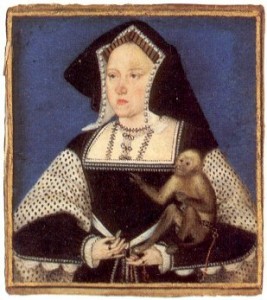 On this day in history, 21st June 1529, Henry VIII and his first wife, Catherine of Aragon, appeared in front of Cardinal Wolsey and Cardinal Campeggio at the Legatine Court at Blackfriars.
On this day in history, 21st June 1529, Henry VIII and his first wife, Catherine of Aragon, appeared in front of Cardinal Wolsey and Cardinal Campeggio at the Legatine Court at Blackfriars.
The purpose of this court was to listen to the testimonies of the King and Queen regarding the validity of their marriage and to rule on the marriage, although we know that Campeggio had been ordered to drag things out as long as he possibly could, giving Catherine the opportunity to appeal directly to Rome.
Giles Tremlett, author of “Catherine of Aragon: Henry’s Spanish Queen”1, writes of how there is confusion regarding the order of events that day, but that it appears that Henry VIII was the first to speak to the court and people, who had cheered his Queen when she entered. Henry spoke of his love for his wife and of his troubled conscience over the fact that he had married his brother’s widow, but it was Catherine’s impassioned speech that day that had the most impact. It was, quite literally, the speech of her life, given on her knees in front of her husband in “a posture of absolute submission”2:-
“Sir, I beseech you for all the love that hath been between us, and for the love of God, let me have justice. Take of me some pity and compassion, for I am a poor woman, and a stranger born out of your dominion. I have here no assured friends, and much less impartial counsel…
Alas! Sir, wherein have I offended you, or what occasion of displeasure have I deserved?… I have been to you a true, humble and obedient wife, ever comfortable to your will and pleasure, that never said or did any thing to the contrary thereof, being always well pleased and contented with all things wherein you had any delight or dalliance, whether it were in little or much. I never grudged in word or countenance, or showed a visage or spark of discontent. I loved all those whom ye loved, only for your sake, whether I had cause or no, and whether they were my friends or enemies. This twenty years or more I have been your true wife and by me ye have had divers children, although it hath pleased God to call them out of this world, which hath been no default in me…
When ye had me at first, I take God to my judge, I was a true maid, without touch of man. And whether it be true or no, I put it to your conscience. If there be any just cause by the law that ye can allege against me either of dishonesty or any other impediment to banish and put me from you, I am well content to depart to my great shame and dishonour. And if there be none, then here, I most lowly beseech you, let me remain in my former estate… Therefore, I most humbly require you, in the way of charity and for the love of God – who is the just judge – to spare me the extremity of this new court, until I may be advised what way and order my friends in Spain will advise me to take. And if ye will not extend to me so much impartial favour, your pleasure then be fulfilled, and to God I commit my cause!”
Henry VIII tried to raise Catherine up twice from her knees during her emotional and defiant speech, but she would not budge. This was her one chance to fight for her marriage in public and she was going to take full advantage of it. It was also an opportunity for her to back “an unsuspecting Henry into a corner”3 and seek his permission to appeal directly to Rome. With his wife on her knees in front of him and a crowd of onlookers sympathetic to Catherine’s plight, Henry had to agree. Catherine had got what she wanted so she stood up, curtseyed to the King and then instead of returning to her seat she strode out of the court ignoring calls for her to come back, saying quite clearly, “On, on, it makes no matter, for it is no impartial court for me, therefore I will not tarry. Go on.”4
Catherine was victorious – she had won this battle, but would she win the war?
Notes and Sources
- Catherine of Aragon: Henry’s Spanish Queen, Giles Tremlett, Chapter 37 “Defiance”
- Ibid
- Ibid
- Ibid